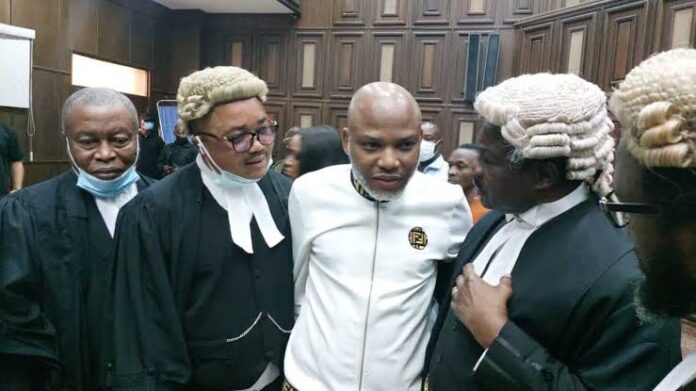The legal drama surrounding Nnamdi Kanu, the leader of the Indigenous People of Biafra (IPOB), has taken a new twist with the controversial figure filing a petition against Justice Binta Nyako of the Federal High Court. The petition, lodged before the National Judicial Council (NJC), accuses the judge of judicial misconduct in the handling of his ongoing terrorism trial.
Kanu, who has been detained for years under charges of terrorism and treasonable felony, argues that his rights have been flagrantly violated due to what he terms judicial bias and misconduct by Justice Nyako. This bold move comes amid mounting concerns about the fairness of his trial and the lengthy period of his detention without resolution.
The Petition and Allegations
The petition, dated January 13, 2024, was submitted to the Chief Justice of Nigeria, who also serves as the chairman of the NJC. In the document, Kanu alleges that Justice Nyako’s actions throughout his trial have caused “incalculable and continuing damage” to him, including the deprivation of his liberty and the infringement of his constitutional rights.
Kanu’s legal team, led by prominent lawyers, argues that the judge’s refusal to grant him bail, despite clear instructions from the Supreme Court, constitutes an act of judicial defiance and misconduct. The central point of Kanu’s complaint revolves around Justice Nyako’s refusal to reinstate his bail, despite a Supreme Court ruling that mandates such action.
Kanu’s brother, Prince Emmanuel Kanu, swore an affidavit in support of the petition. The document claims that the actions of Justice Nyako contradict the provisions of Nigeria’s Constitution, specifically Section 287(1), which mandates that all authorities and courts enforce the decisions of the Supreme Court.
Legal Background and Context
Kanu is currently facing seven counts of terrorism related to his leadership role in IPOB, a secessionist movement in the southeast region of Nigeria. The group has been labeled a terrorist organization by the Nigerian government, leading to Kanu’s arrest and detention in 2015. His trial began under Justice Nyako’s supervision, with the charges stemming from Kanu’s alleged incitement to violence and rebellion against the state.
However, Kanu has remained vocal about his belief that the charges are politically motivated, aimed at silencing his advocacy for the independence of Biafra. His detention without trial for extended periods and the lack of progress in his case have raised eyebrows among human rights organizations and legal experts, who have accused the Nigerian government of using the judiciary as a tool of political repression.
In the petition, Kanu expresses dissatisfaction with what he perceives as a deliberate attempt to undermine his legal rights and delay the judicial process. He also points out that Justice Nyako’s refusal to grant him bail, despite the Supreme Court’s ruling, is a flagrant violation of constitutional law.
Kanu’s Statement on Judicial Bias
In his petition to the NJC, Kanu did not hold back, accusing Justice Nyako of “judicial fraud” and blatant “non-adherence to the Constitution.” He emphasized that his detention and the continued refusal to grant him bail has severely affected his health, liberty, and constitutional rights.
“Justice Binta Murtala-Nyako currently presides over Court 2 of the Federal High Court, Abuja Division. Her conduct amounts to judicial fraud and non-adherence to the Constitution and established rules of law,” Kanu stated. He further accused the judge of disregarding the rule of law and violating his fundamental rights by refusing to abide by the Supreme Court’s directives.
The IPOB leader’s statement concludes with a formal request to the NJC to discipline Justice Nyako for her conduct, urging the council to take corrective action in accordance with the rules governing judicial conduct in Nigeria.
The Response and Legal Implications
The NJC is now tasked with reviewing the petition and investigating the allegations against Justice Nyako. This is not the first time the judicial conduct of Nigerian judges has come under scrutiny, but Kanu’s high-profile case adds weight to the calls for greater accountability and transparency within the judiciary.
If the NJC finds merit in Kanu’s petition, it could lead to disciplinary action against Justice Nyako, ranging from a reprimand to more severe penalties such as suspension or removal from office. Such a development would undoubtedly have a significant impact on Kanu’s trial and the public perception of the Nigerian judicial system.
However, some legal experts believe that the petition might be more symbolic than practical, considering the power dynamics at play. “It is unclear whether the NJC will take any decisive action against Justice Nyako, as there are often political influences in high-profile cases such as this,” one legal analyst remarked.
Nevertheless, Kanu’s petition signals his ongoing resolve to fight for his freedom and challenge the legal processes that he claims have been manipulated against him. For his supporters, the petition represents a broader battle against what they perceive as systemic injustice within Nigeria’s legal and political systems.
A Broader Context of Legal Struggles
Nnamdi Kanu’s legal struggles have captured the attention of both national and international observers. His case has become emblematic of the tensions between the Nigerian government and the southeastern region, where calls for independence have been met with harsh crackdowns by security forces.
The IPOB leader’s arrest in 2015 was followed by protests and calls for his release from various human rights organizations, civil society groups, and international bodies. Kanu’s supporters argue that his detention is politically motivated and that the charges against him are an attempt to silence dissent and suppress the movement for Biafra’s independence.
However, the Nigerian government maintains that Kanu’s actions are destabilizing and pose a threat to national security. In response, the government has taken a hardline stance, refusing to back down from prosecuting Kanu under the terrorism charges.

